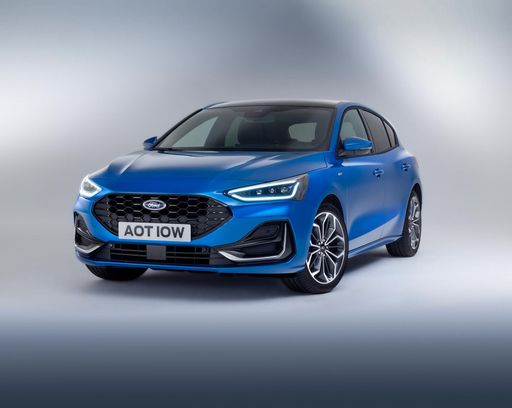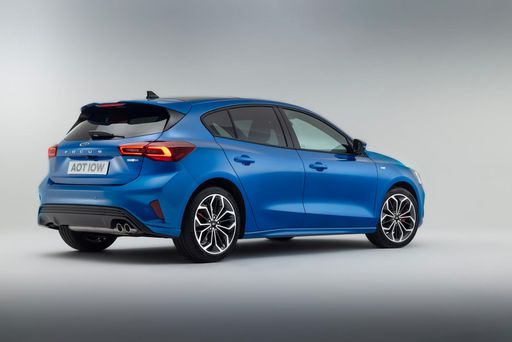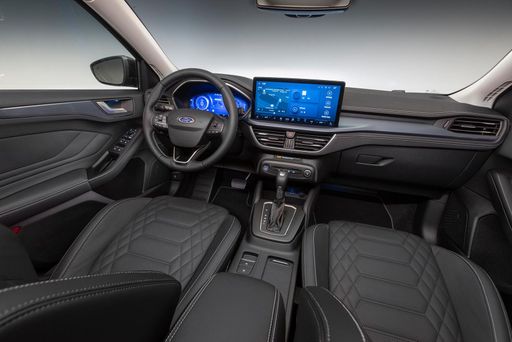Ford Focus vs Toyota Prius - Differences and prices compared
Compare performance (280 HP vs 223 HP), boot space and price (27500 £ vs 39400 £) at a glance. Find out which car is the better choice for you – Ford Focus or Toyota Prius?
Costs and Efficiency:
Price and efficiency are key factors when choosing a car – and this is often where the real differences emerge.
Ford Focus has a decisively advantage in terms of price – it starts at 27500 £, while the Toyota Prius costs 39400 £. That’s a price difference of around 11906 £.
Fuel consumption also shows a difference: Toyota Prius manages with 0.50 L and is therefore clearly more efficient than the Ford Focus with 4.90 L. The difference is about 4.40 L per 100 km.
Engine and Performance:
Under the bonnet, it becomes clear which model is tuned for sportiness and which one takes the lead when you hit the accelerator.
When it comes to engine power, the Ford Focus has a distinct edge – offering 280 HP compared to 223 HP. That’s roughly 57 HP more horsepower.
In acceleration from 0 to 100 km/h, the Ford Focus is a bit quicker – completing the sprint in 5.70 s, while the Toyota Prius takes 6.80 s. That’s about 1.10 s faster.
In terms of top speed, the Ford Focus performs distinct better – reaching 250 km/h, while the Toyota Prius tops out at 177 km/h. The difference is around 73 km/h.
Space and Everyday Use:
Whether family car or daily driver – which one offers more room, flexibility and comfort?
Both vehicles offer seating for 5 people.
In curb weight, Ford Focus is noticeable lighter – 1330 kg compared to 1620 kg. The difference is around 290 kg.
In terms of boot space, the Ford Focus offers evident more room – 392 L compared to 284 L. That’s a difference of about 108 L.
When it comes to payload, Ford Focus clearly perceptible takes the win – 560 kg compared to 375 kg. That’s a difference of about 185 kg.
Who wins the race?
The Toyota Prius proves to be wins the duel decisively and therefore becomes our DriveDuel Champion!
Toyota Prius is the better all-rounder in this comparison.

Toyota Prius
Costs and Consumption
View detailed analysis
Engine and Performance
View detailed analysis
Dimensions and Body
View detailed analysis
Ford Focus
The Ford Focus remains a clever all‑rounder that balances sharp handling with everyday comfort, making it a strong choice whether your commute is city streets or country lanes. Its practical cabin and sensible running costs mean you’ll spend more time enjoying the drive and less time worrying about ownership, with a playful streak underfoot that keeps things interesting.
details


Toyota Prius
The Prius glides through traffic like a wise commuter's secret weapon, balancing miserly running costs with an unflappable sense of reliability. It's not a thrill seeker, but its roomy cabin, sensible packaging and low-stress driving personality make it a brilliant choice for buyers who value peace of mind over pulse-raising performance.
details




|

|
|
|
|
Costs and Consumption |
|
|---|---|
|
Price
27500 - 42700 £
|
Price
39400 - 45800 £
|
|
Consumption L/100km
4.9 - 8 L
|
Consumption L/100km
0.5 - 0.7 L
|
|
Consumption kWh/100km
-
|
Consumption kWh/100km
-
|
|
Electric Range
-
|
Electric Range
72 - 86 km
|
|
Battery Capacity
-
|
Battery Capacity
-
|
|
co2
117 - 183 g/km
|
co2
12 - 17 g/km
|
|
Fuel tank capacity
52 L
|
Fuel tank capacity
40 L
|
Dimensions and Body |
|
|---|---|
|
Body Type
Hatchback
|
Body Type
Hatchback
|
|
Seats
5
|
Seats
5
|
|
Doors
5
|
Doors
5
|
|
Curb weight
1330 - 1529 kg
|
Curb weight
1620 - 1630 kg
|
|
Trunk capacity
392 L
|
Trunk capacity
284 L
|
|
Length
4382 - 4397 mm
|
Length
4599 mm
|
|
Width
1825 - 1844 mm
|
Width
1782 mm
|
|
Height
1438 - 1482 mm
|
Height
1470 mm
|
|
Max trunk capacity
1354 L
|
Max trunk capacity
-
|
|
Payload
495 - 560 kg
|
Payload
365 - 375 kg
|
Engine and Performance |
|
|---|---|
|
Engine Type
Petrol MHEV, Diesel, Petrol
|
Engine Type
Plugin Hybrid
|
|
Transmission
Manuel, Automatic
|
Transmission
Automatic
|
|
Transmission Detail
Manual Gearbox, Dual-Clutch Automatic, Automatic Gearbox
|
Transmission Detail
CVT
|
|
Drive Type
Front-Wheel Drive
|
Drive Type
Front-Wheel Drive
|
|
Power HP
115 - 280 HP
|
Power HP
223 HP
|
|
Acceleration 0-100km/h
5.7 - 11.8 s
|
Acceleration 0-100km/h
6.80 s
|
|
Max Speed
186 - 250 km/h
|
Max Speed
177 km/h
|
|
Torque
170 - 420 Nm
|
Torque
-
|
|
Number of Cylinders
3 - 4
|
Number of Cylinders
4
|
|
Power kW
85 - 206 kW
|
Power kW
164 kW
|
|
Engine capacity
999 - 2261 cm3
|
Engine capacity
1998 cm3
|
General |
|
|---|---|
|
Model Year
2022 - 2024
|
Model Year
2023
|
|
CO2 Efficiency Class
D, G
|
CO2 Efficiency Class
B
|
|
Brand
Ford
|
Brand
Toyota
|
What drive types are available for the Ford Focus?
Available configurations include Front-Wheel Drive.
The prices and data displayed are estimates based on German list prices and may vary by country. This information is not legally binding.
